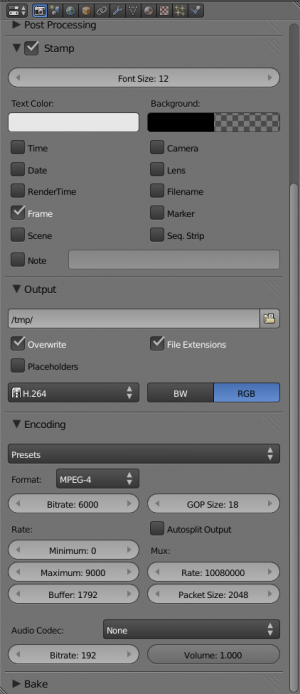Difference between revisions of "Boomsmash"
From URCHN Arkipelago
Views
Actions
Namespaces
Variants
Tools
| Line 1: | Line 1: | ||
| + | == Setting the Output options == | ||
| + | You only need to do this once, ever for a file, unless you are switching options. | ||
# in the properties editor go to the Render Context (first button)[[File:props_render.png]] | # in the properties editor go to the Render Context (first button)[[File:props_render.png]] | ||
| − | # in the Output Panel, set your output filepath by clicking on the folder icon and browsing to a suitable folder (e.g. your Desktop)[[File: | + | # in the Output Panel, set your output filepath by clicking on the folder icon and browsing to a suitable folder (e.g. your Desktop)[[File:Output_conf_linux2.png|thumb|right|linux settings]] |
# Select your Format in the Output panel. Suitable formats are H.264, Quicktime (if on a Mac) | # Select your Format in the Output panel. Suitable formats are H.264, Quicktime (if on a Mac) | ||
# If you selected Quicktime, Select the H.264 Video Codec | # If you selected Quicktime, Select the H.264 Video Codec | ||
| − | # If you selected H.264, | + | # If you selected H.264, Go to the Encoding Panel, and, under presets, pick H.264, then, under format, select MPEG-4. This is what you'd generally use under linux. |
| + | # Advanced: Some Linux users may want to reencode in ffmpeg or handbrake, to produce 'nicer' files for other platforms. | ||
| + | # Now we want some Frame Stamping: Enable and expand Stamp, and uncheck everything but 'Frame' | ||
Revision as of 14:09, 13 July 2012
Setting the Output options
You only need to do this once, ever for a file, unless you are switching options.
- in the properties editor go to the Render Context (first button)

- in the Output Panel, set your output filepath by clicking on the folder icon and browsing to a suitable folder (e.g. your Desktop)
- Select your Format in the Output panel. Suitable formats are H.264, Quicktime (if on a Mac)
- If you selected Quicktime, Select the H.264 Video Codec
- If you selected H.264, Go to the Encoding Panel, and, under presets, pick H.264, then, under format, select MPEG-4. This is what you'd generally use under linux.
- Advanced: Some Linux users may want to reencode in ffmpeg or handbrake, to produce 'nicer' files for other platforms.
- Now we want some Frame Stamping: Enable and expand Stamp, and uncheck everything but 'Frame'
